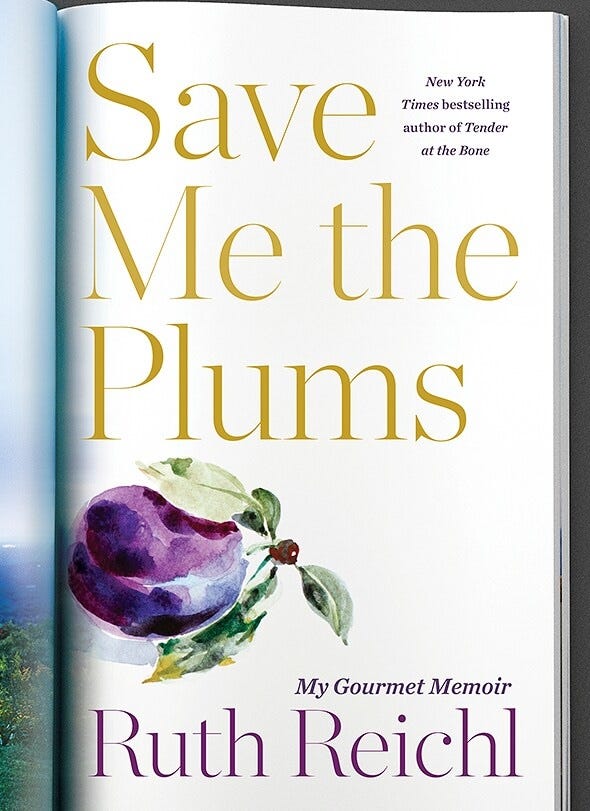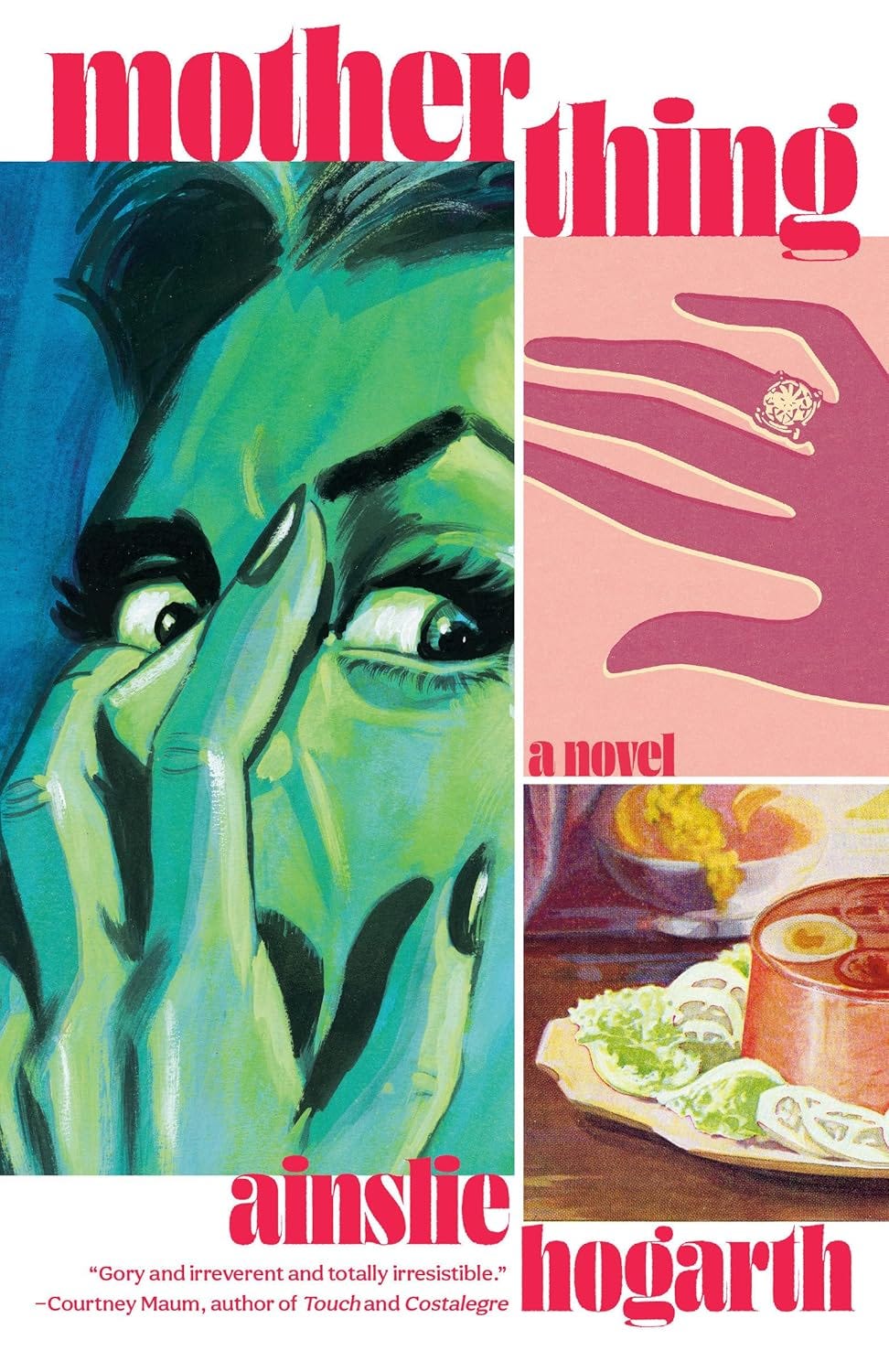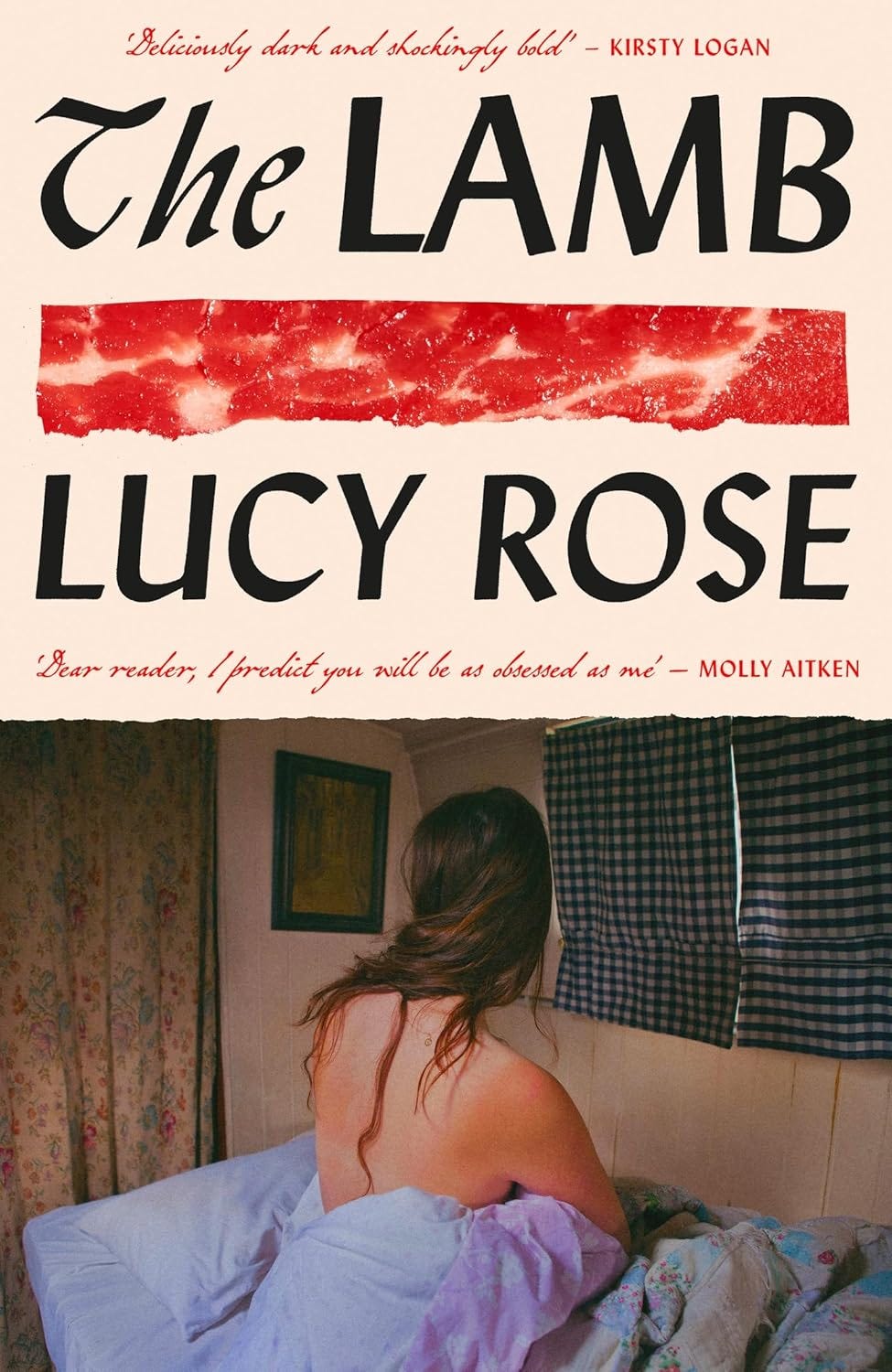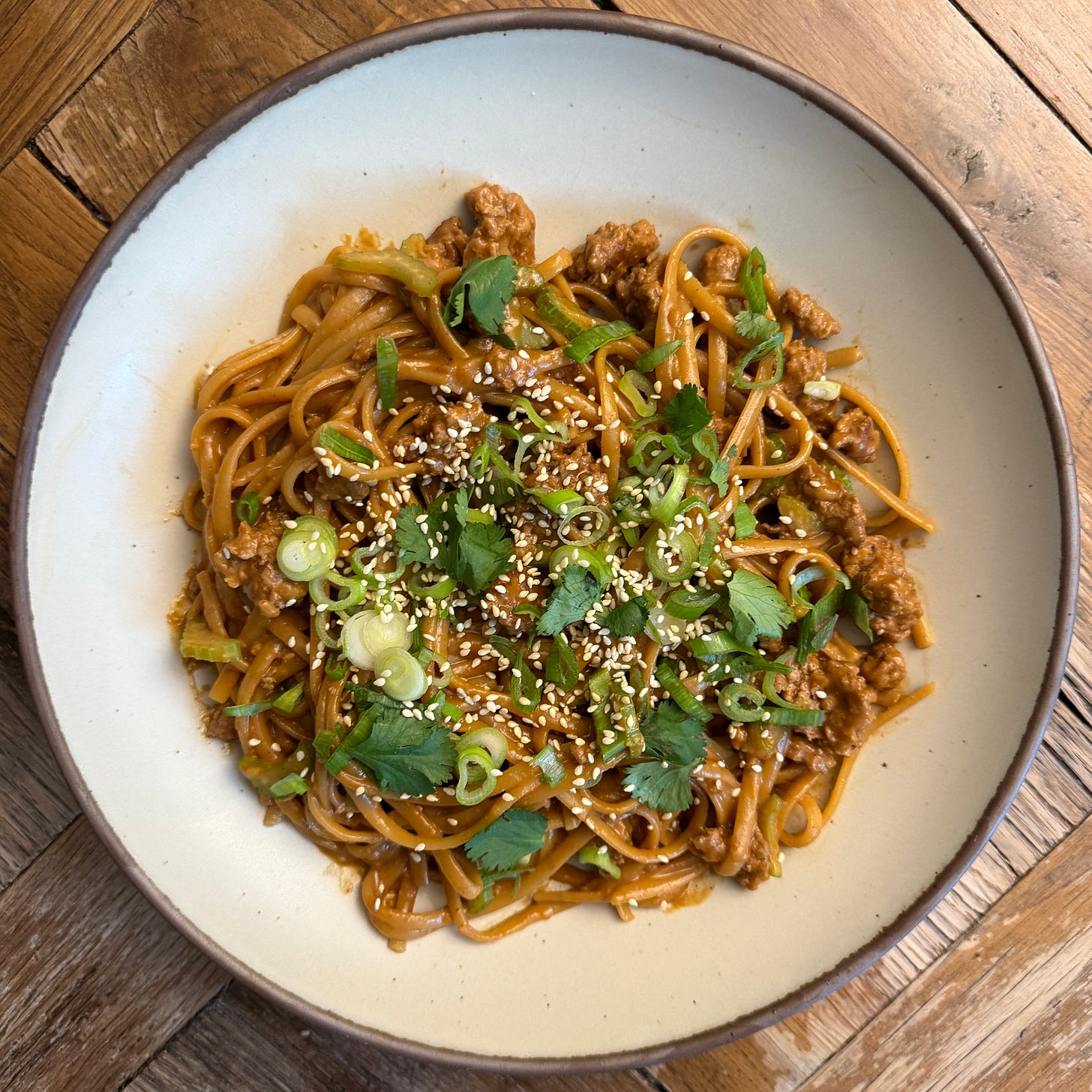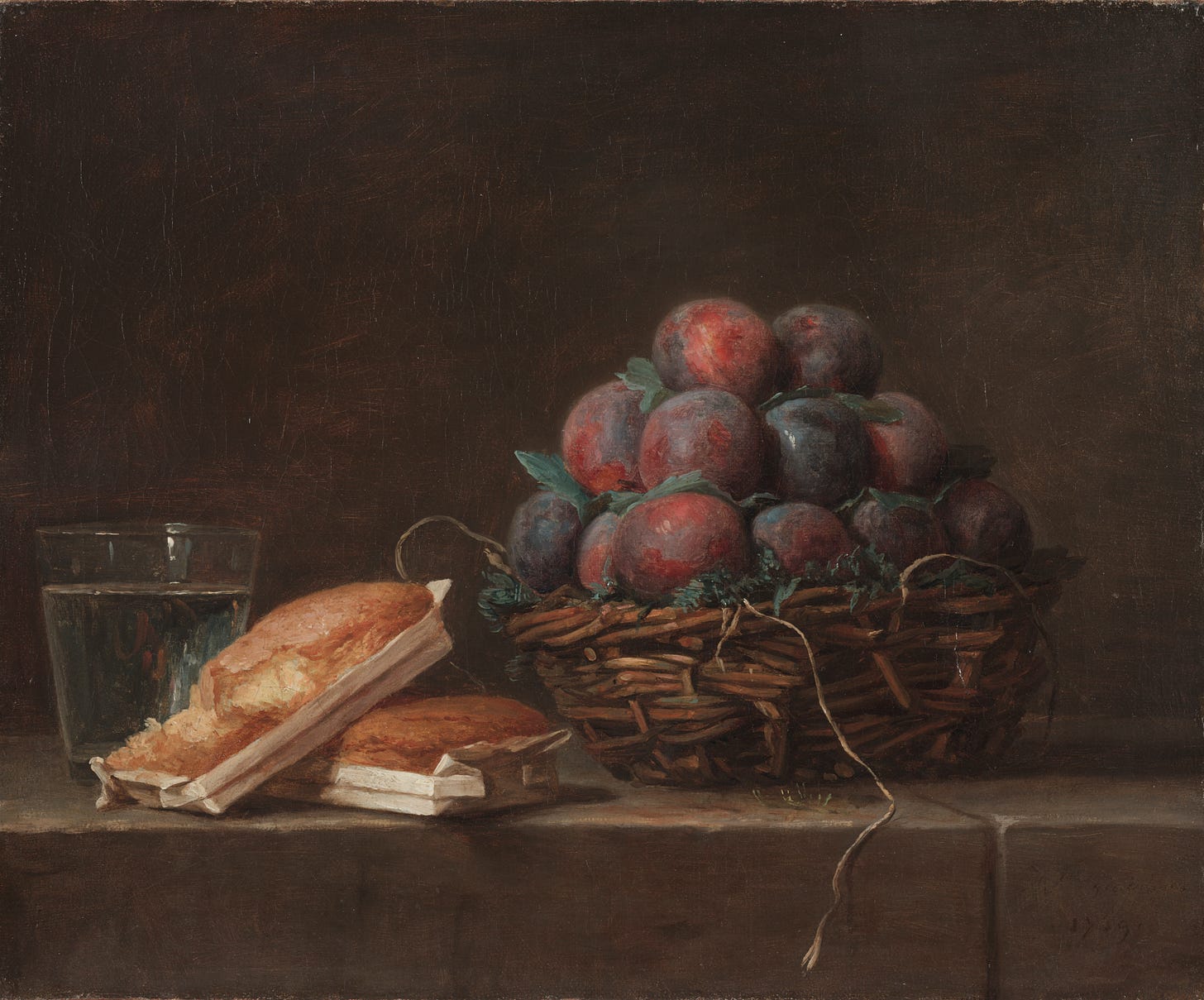
Good evening! I hope you all had a restful weekend. This past week, I read a memoir by a food writer and two fiction books with horror elements.
Before we get into it, I must warn you that this is a slightly unhinged mix of books, held together by a vague food theme. Ruth Reichl’s memoir, Save Me the Plums, is a delightful book about food and her time at Gourmet magazine. In contrast, The Lamb and Motherthing are domestic horror works that both contain cannibalism. The Lamb disturbed me so much that I took a break from eating meat.
Why did I torture myself last week? In my defense, I read Save Me the Plums first and then picked up The Lamb for my book club. Said book club has since selected the new Emily Henry romance novel as our May pick to balance things out.
Needless to say, The Lamb put me in a weird place. I decided to lean into this and read Motherthing, which has been on my nightstand for months. After reading both, I can say that if you want to read one feminist horror book, read Motherthing and skip The Lamb.
Now, let’s get into it.
read📖→
Save Me the Plums: My Gourmet Memoir by Ruth Reichl
Save Me the Plums is a memoir by Ruth Reichl about her tenure as editor-in-chief of Gourmet magazine, Condé Nast’s oldest epicurean publication, from 1999 to until it closed in 2009.
Overview: Reichl worked as a New York Times restaurant critic before she was offered the editor-in-chief role of Gourmet magazine in 1999. She initially declined the job, but eventually accepted the coveted job that came with first-class travel, a clothing allowance, and a personal driver.
At Gourmet, Reichl pushed the boundaries of food writing after she published David Foster Wallace’s essay, “Consider the Lobster.” She later published “Some Pig,” David Rakoff’s “extremely controversial piece on the tortured relationship between Jews and bacon,” and “The Taste of Home,” Junot Diaz’s essay about “how his love for Asian food is inextricably linked with his yearning for his absent father.”
Near the end of her tenure at Gourmet, Reichl wrote an article about traveling to Paris on a budget during the financial crisis. The trip was a marked contrast from her cushy corporate world. She reflects: “The more stars in your itinerary, the less likely you are to find the real life of another country.”
Opinion: A friend recommended this book to me after I mentioned that I liked Ina Garten’s memoir. The title comes from William Carlos Williams’s poem, “This Is Just To Say”: “I have eaten/ the plums/ that were in/ the icebox/ and which/ you were probably/ saving/ for breakfast/ Forgive me/ they were delicious/ so sweet/ and so cold.”
Save Me the Plums is an enjoyable romp through the world of magazine publishing in the late 1990s and early 2000s. These were the glory days for magazines, reminiscent of The Devil Wears Prada. I laughed reading about how Reichl encountered New Yorker editor David Remnick at the airport. She was traveling in economy, and Remnick quipped: “You’re at Condé Nast now . . . . You shouldn’t be traveling like that.”
Reichl writes well and descriptively, and her vivid descriptions of food and cooking make this memoir enjoyable. Take this description of Reichl drinking champagne and eating an amuse-bouche in Paris:
Dom Perignon is not the ideal way to great a new country when you’ve been flying all night.
I know that.
Still, when the driver who picks me up at Charles de Gaulle takes me straight to lunch at Pierre Gagnaire, I do not refuse the crystal flute the waiter hands me. I watch the bubbles drift lazily to the top, inhale that fine aroma—grapes, yeast, and age—and take a sip. Pow! the champagne zooms straight to my head.
A crimson sorbet arrives cradled in a small glass dish. I dip in a spoon in a tumble of tomatoes, herbs, and horsheradish, terrible in its cold tartness, assaults my mouth. The sorbet buzzes against my tongue, shocking me into the moment. One more bite, and I am experiencing the food with psychadelic intensity.
Overall: This is a fun and easy read that I’d recommend to anyone who loves food writing!
Rating: 3.9/5
Genre: Nonfiction (Memoir)
Page count: 266 pages
Audio: 7 hours 55 minutes
Movie/TV pairings: The Devil Wears Prada, Julie and Julia
Food pairings: Jeweled chocolate cake
Motherthing by Ainslie Hogarth
Motherthing follows a recently married couple, Ralph and Abby Lamb, as they deal with the aftermath of the death of Ralph’s mother.
Overview: Motherthing opens with the news that Ralph’s mother, Laura, has killed herself, leaving Ralph “a thirty-one-year-old orphan.” Ralph and Abby are in the hospital and must deal with the logistics of Laura’s death, like whether to cremate her body. The book is written in stream-of-consciousness from Abby’s first-person perspective.
We learn that Ralph and Abby recently moved from their city apartment to Laura’s dark suburban home to help care for Laura, who was struggling mentally. Both Abby and Ralph have serious mommy issues. Abby had a narcissistic mother who ignored her in favor of her boyfriends. Abby had hoped for a new mother figure in Laura, but Laura wasn’t exactly mother of the year. Laura had borderline personality disorder and treated both Abby and Ralph cruelly.
Ralph and Abby thought they were “strong enough” to move in with Laura. Ralph was “equipped with resources he’d downloaded from a website called the Borderline Parent, and a swear-on-your-life promise from me that I could handle this temporary uprooting.” He even practiced “mindfulness, deep breathing, and calming visualizations, reminding himself that he was a whole and separate person from her with a whole and separate life, and that he could love her and support her without turning to dust.” However, Ralph couldn’t get out of Laura’s shadow or shake the memories he had in the house—“here her health and happiness had been his sole responsibility, where she’d only showed affection when he was sad, only gave attention to his tragedies.”
While you would think Laura’s tyranny over the young couple would end with her death, it does not. Ralph spirals mentally and becomes paranoid that his mother’s ghost haunts the house. Undeterred, Abby sets out trying to excise Laura’s ghost, the motherthing: “I can cure Ralph. Because it’s what I was born to do. Remember that, Abby, vanquishing this depression is your true calling as a wife.” What could go wrong?
Opinion: I bought Motherthing back in the fall when I thought I would read a few horror books for October. Motherthing belongs to a growing group of surrealistic fiction novels that feature chaotic female protagonists, like Rachel Yoder’s Nightbitch. In my opinion, for this type of book to succeed in this genre, it needs to be well-written and convey some underlying truth that the reader can identify with. I think Motherthing does so here.
Hogarth’s writing is darkly funny. Some of the more grotesque humor isn’t my personal brand of comedy, but I enjoyed reading Hogarth’s mother-in-law jokes. For instance, when Ralph first tells Abby his mother is back as a ghost, he says Laura watched Abby clean: “She said it was sweet of you to let me sleep.” Abby immediately calls “bullshit” and after some proding, Ralph reveals that the ghost of his mother actually insulted Abby: “She wondered why you didn’t think to borrow Irena’s steamer for the baseement carpet before ripping it up.”
Underlying Motherthing is a story about how our parents can break us. The story may be fantastical, but I think readers can understand some of these more complex dynamics. Take this description of the relationship between Ralph and his mother:
“My mother played the piano when she was small, did you know that? She was very good, might have even been great if my grandmother had been more supportive. And now here this is.” It’s hard to determine how he’s feeling in this green light, his expression so obscured by it, like ooze running down his face. Though it’s not a good sign that he’s reciting one of Laura’s grand mythologies: her innate artistic abilities, which her mother refused to nurture; the sacrifices Laura had made for Ralph, especially when it came to men, so that sometimes the way Ralph and his mother interacted was more like flirting: he’d pop out from behind a door and spook her, tickle her till she screamed and slapped him gently on the arm. Then they’d fizzle from the interaction as though it had never happened, like a pair of actors working in a haunted house doing the same scene over and over again.
That said, the book isn’t perfect. Some parts feel disjointed, and it requires some mental leaps to reach the ending. While Ralph is well-developed, Abby’s backstory felt only sketched out. I couldn’t fully understand her. This was probably intentional—Abby’s delusions are part of what makes this novel funny and unexpected.
Overall: This book is not for everyone, and it doesn’t quite measure up to the giants of this genre, like Deborah Levy. However, if you liked Nightbitch, you’ll likely enjoy Motherthing.
Rating: 3.7/5
Genre: Fiction (Psychological Thriller/Domestic Horror)
Notable prizes/book clubs/lists: A NYT Notable Book of the Year (2022)
Page count: 288 pages
Audio: 7 hours 1 minutes
Movie/TV pairings: Nightbitch, Monster in Law
Food pairings: Chicken a la king
The Lamb by Lucy Rose
The Lamb is a folk horror novel that follows an eleven-year-old girl, Margot, who lives with her deranged and cannibalistic mother in the Cumbrian woods.
Overview: The Lamb opens with a line meant to shock: “On my fourth birthday, I plucked six severed fingers from the shower drain.” Margot’s mother, whom she calls “Mama,” routinely lures “strays”—lost hikers, drivers, and walkers—into her home and cares for them before murdering them. The book is narrated in Margot’s first-person perspective.
Mama abuses Margot. She forces her to eat the “strays”: “Mama didn’t feed me from breast or bottle. She gave me blood.” She also hits her: “Only when she was really angry, the sort of rare anger that burns out of control, would she give me bruises or marks. She told me these marks were called special kisses. Special kisses on my cheek.” Margot’s father is out of the picture and has been missing for years. Margot’s only respite from this world is school, but Mama discourages her from forming any friendships.
One day, a beautiful woman named Eden arrives during a snowstorm, and she and Mama fall in love. Mama clings tightly to Eden but doesn’t seem to know how to love her or Margot. At one point, Mama collects hemlock to poison Eden as a failsafe. Margot asks: “Why would you need poison to keep her close? Why not something beautiful like a fern? Or a dandelion?” Mama replies: “Why would I risk it?” Rose follows the dynamics between Margot, Eden, and Mama as they live in the woods.
Opinion: The Lamb is a macabre tale that takes the perspective of the witch in Hansel and Gretel. I was intrigued by the premise of The Lamb, and there are several ways to interpret this cannibalistic tale—women reclaiming their bodies, the resentment that comes with aging, a broader story about child abuse, or an indictment of eating meat.
However, I don’t think this book executes well in the feminist horror genre. Writing from a child’s perspective can be challenging, but it can be done well, like in Room by Emma Donoghue. Unfortunately, the writing style here did not impress me. Margot’s insights did not strike me as very profound or interesting: “I wondered if this was what being a real human was: accepting you were pieces of other people too. The people you loved and the people you hurt.”
The characters all sounded more or less the same, and I don’t think the dialogue was varied enough. Margot’s narration was very repetitive, and I actually got bored with the graphic descriptions of cutting up human bodies by the end.
Unlike Motherthing, these characters and their relationships didn’t feel real—there was little I could recognize and sympathize with. They seemed more like caricatures than real people. The Lamb is clearly a work of folk horror, intended to be shocking and extreme. However, I think there must be some genuine dynamics and character traits that the reader can identify with or understand for this type of story to resonate. The numerous plot holes in The Lamb probably don’t help these issues. Why does Eden suddenly join this cannibal household? I also had several questions about how these murders went unnoticed by the police, but I’ll spare you those thoughts.
Overall: I would not recommend this to a friend. While I think The Lamb could have been a great short story, I don’t think there was enough to warrant a 300+ page novel.
Rating: 2/5
Genre: Literary Fiction (Folk Horror)
Page count: 336 pages
Audio: 7 hr 56 min
Food pairings: Vegetables, since these characters sorely need them.
consumed 🎬🎧🗞️→
I have been following the funeral Mass of Pope Francis, the politics surrounding it, and the conclave.
Lorde’s new single, “What Was That,” is finally out.





